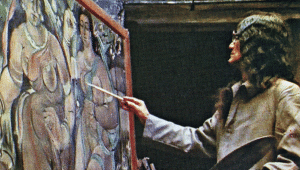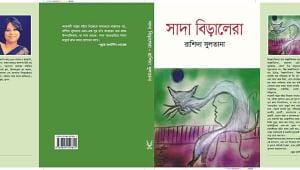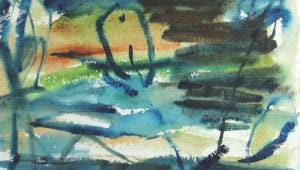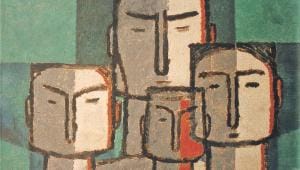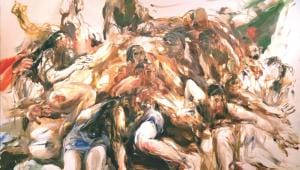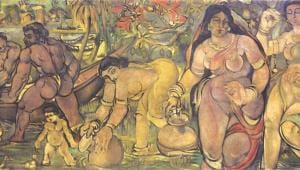Mustafa Zaman
98th Birth Anniversary of SM Sultan / SM Sultan: The vision of a coming society
9 August 2021, 18:00 PM
Sultan, a painter, visionary and a subaltern guru, apparently emerged out of the social “utopia” that surfaced during Bangladesh’s Liberation War—one that animated the masses, as opposed to the narrative of the emergent ruling elite, where this dream of a coming community later collapsed into mere words or a set of symbolic gestures.
9 August 2021, 18:00 PM
star reviews / Shada Beralera: Nitu and the spectre of a landscape
13 November 2020, 18:00 PM
Rashida Sultana’s first novel entitled Shada Beralera (White Cats) comes in a slim package of 80 pages and is coloured by a passive discontent.
13 November 2020, 18:00 PM
Monsoon and the Visuality of Rain
12 August 2018, 18:00 PM
When we set out to respond to rain, which appears to have soaked the human body and soul over the millennia, we must be aware that
12 August 2018, 18:00 PM
Exhibition / Far from the Maddening Crowd
10 May 2018, 18:00 PM
"Far from representing reality, pictures probe multiple realities by fabricating narratives of events that never occurred." This quote by Mark C Taylor from his book on the American painter Mark Tansey sounds like a fitting homage to the works of Kazi Mrinal. Mrinal's images are like visioned unreality. They are structured by the communion-seeking mind rather than originating from contemplation or critical reflection on real events.
10 May 2018, 18:00 PM
Into the Fold, Out in the One
5 April 2018, 18:00 PM
As a reconnaissance of what seems like a neural landscape, Soma Surovi Jannat's oeuvre seems to hover over the "plain of immanence" perceived as Spinoza's "single substance" (God/Nature), thereby, lending
5 April 2018, 18:00 PM
Art / Articulating Life as It Unfolds
21 December 2017, 18:00 PM
One of the pioneers of modern art in undivided Bengal, "Shilpacharya" Zainul Abedin (1914-1976) represents the mid-century "realist" trajectory that began to unfold in many modes and sequences—first in Calcutta...
21 December 2017, 18:00 PM
Iconoclastic figurality in Shahabuddin Ahmed
14 September 2017, 18:00 PM
Alpha male striving to take on the future by breaking free of the bounds of the existential matrix—this is how a Shahabuddin addict might try and unhinge oneself from the "rote understanding" of his scampering, hurtling males for which he has made a name, at home and abroad.
14 September 2017, 18:00 PM
ART / Sultan's atemporal vision of awakened bodies
10 August 2017, 18:00 PM
S.M. Sultan, in an organic way, devised a strategy to simultaneously belong to the past and the present, to the East and the West, to 'here' and 'nowhere'.
10 August 2017, 18:00 PM
The vision of a coming society
He chose to settle down in Narail, his home village, not to seek refuge in the bucolic distance, but to lend voice to the subaltern and to "talk back to the centre", vigilantly abrogating the colonial legacies that burden us to date.
6 August 2017, 18:00 PM



